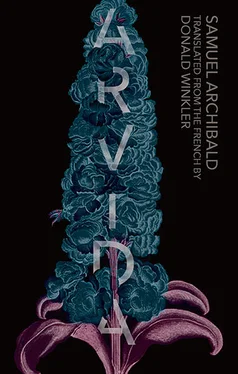3
The men say:
There was already nothing that could be done to protect them from themselves and the madness that had seized hold of their minds. During their progress they were surrounded by two bands of five bodyguards that they had chosen and paid, as we later learned, with money belonging to Sapporo’s uncle. The first was from here, the second were gaijin .
The first were bad men, consumed with a dark nostalgia for the licence their ancestors enjoyed under the ancient shogunates. The second were not much better. The Great War had horrified the entire world. These men had built their nests and grown to maturity there less like birds of prey than like reptiles, whose pale eyes and chill blood they shared. In their barracks they had been told, “You’ll see, when you have to kill a Boche with no bullets in your gun, you’ll see, when you throw yourself on him screaming over his screams and stick your bayonet in his gut not knowing if he’s found a way to thrust his into yours, and you watch his gaze go dim not knowing if you’re guttering out as well, then you’ll see what that does to you.” They went off, they saw what there was to see, they didn’t die, and they felt nothing. Not fear, not disgust, not pleasure, not anything. Their comrades in the regiment had gone back to their villages where they tried not to think of the war, tried to hide their mangled or absent limbs in the sleeves of their shirts and their pant legs, tried to forget the great swathes of their souls that had collapsed within them and now surfaced only in nocturnal outbursts of terror loosed from the depths of a nightmare. Meanwhile the soldiers of fortune roamed the world and reaped the benefits of this monstrous void in themselves as though it were a gift.
The children trained their narrowed eyes through the cracks in the palisade and reported that these men were abandoning themselves to barbaric jousts, taking turns doing tricks like little kittens, some learning to wield the katana, and others to action the breech of the assault rifles, all fighting bare-handed under the afternoon sun, and sometimes, haloed by lanterns, into the night, to the immense delight of Misaka and Reiko, who were much entertained by these games, and applauded them wildly from the veranda with their bound hands.
We wrote a letter to the uncle in Sapporo to inform him of the situation. He arrived in a car, had the doors to his own house thrown open with great difficulty, and came out a half-hour later, white-faced and hollow-eyed. He spoke with the mayor, told him that he was cutting off support for Reiko, that that was all he could do, and that with a bit of luck the renegades would disappear when they ran out of money.
“Do you want to be informed when that happens?” asked the mayor.
The uncle from Sapporo got into his car and said that we would have to exercise our own good judgment and deal with his niece and his other possessions in the village as we thought best, because he would never return to Rausu, and would never open a letter sent from here.
We realized too late that the renegades had found more in Rausu than a good income. After a few months, as we awaited their imminent departure, the mercenaries began to descend on the town every week to extort money from the businessmen and citizens and bring back supplies to their new mistresses.
Reiko says:
I breathed deeply so my uncle would hear the whistling Misaka and I made since we’d slashed away our lips, the sucking noise every breath required to return to our mouths the naked drool flowing onto our gums. I breathed like that for a long moment, then, in one flourish, I spread the wings of my cape while lifting my arms as though to fly away. I wanted him to see below, where I was unclad. I wanted him to see all the marks, the old ones that wouldn’t have had time to heal even if I’d lived a thousand years, and the new ones, unsettling, hideous, because Misaka and I always waited a day or two before disinfecting the wounds, to feel the pus clinging claw-like to our flesh, like an animal holding to its lair. I wanted him to see that I could not promenade on his arm in a ball dress in Rio or New York, nor sunbathe in Monte Carlo. I wanted him to see my flat, blank breast that would never suckle a child. I wanted him to know that Misaka and I had together determined the definitive length and form of my cleft.
Oh, you may believe if you like that I had no say in all that, and that all the dissipation you find so horrible was forced on me by Misaka, but you will not talk about it because on this subject you never dare speak a word, and there is nothing that has been forced into my mouth, into my cleft, between my buttocks or into my flesh that I have despised as much as your silence, that silence sour as milk that Misaka the accursed never made me drink.
4
Reiko says:
I did not invent the art; the art invented itself through me. In due course we became aware that certain wounds, as they healed, imprinted on the flesh sinuosities that resembled writing. Because I had a finer hand, Misaka wanted me to tattoo characters on our skin with a knife blade, but I said that would be too easy, too obvious, and I didn’t want their symbols on her skin or mine. I said that, in any case, what made these marks interesting was not the script, nor even the movement it sometimes suggested, but the thickness, the texture. I knew our path was not to draw, whether it be with a razor, on the skin itself, but to shape the flesh. I began by experimenting on myself, finding a way to open up the tissues and have them hold in the desired position, preventing the wounds from closing over and the skin from drying out, blending in alcohol, tincture of iodine, and wood varnish. Soon the forms became too complex for me to produce them on my own body, and I began to carve into Misaka’s flesh. The art gradually became a blend of engraving, sculpture, and fabric design. I dug furrows and cut strips of skin with dressmaking shears, gouges, and burrs; I kneaded the oozing flesh with my hands and shored it up with cross-stitching and satin stitching; I inserted rivets, splints, and pins between the strips when my configurations required open skin and erect parings.
The problem was that I was both more skilled than Misaka, and had greater endurance. The art was very hard on her. She sweated, vomited, and fainted. We had to experiment with drugs, but often the pain became too severe to be dulled even by powerful opiates.
Curiously, it was the men who found the solution when they sent us one of their spouses to renew the contact between us. The renegades brought us Azumi in the middle of the afternoon, on a Thursday. She had made herself lovely in her summer dress, and had arrived with gifts. We talked to her about art. We showed her the results, on Misaka’s body. We saw the curiosity that lent a gleam to her large black pupils. Misaka bared her shoulder, we had her drink a soothing infusion, and I placed myself beside her with my instruments. She was breathing deeply. I sought Misaka’s eyes and saw that she’d already understood. We’d been missing one ingredient. You needed to be three to practise the art. Misaka went down on all fours and only a few seconds after I’d set to work, thrust her face between the legs of Azumi, already dazed by the drug and the pain. Azumi didn’t protest, she even unfastened her dress a bit more and in a sudden spasm, offered her cleft to Misaka’s mouth.
I bested her in suffering, but with her tongue she was superior to me.
We let Azumi leave for home later, dazed, dishevelled, and covered in her own blood. Misaka well knew that we’d gone too far. Immediately afterwards, she said to the renegades:
“Get ready. The villagers will be on their way.”
But there was no attack that night. Instead, Azumi returned the next day with a young wife even prettier than herself, who pointed with her finger to the motif, much resembling a gillyflower, which I’d carved into her friend’s soft shoulder, and said:
Читать дальше












